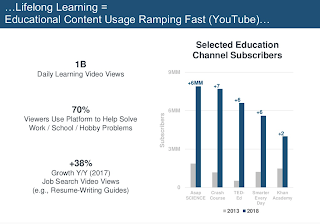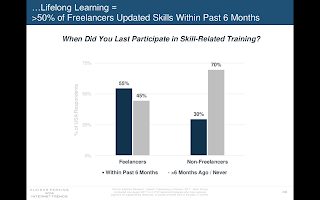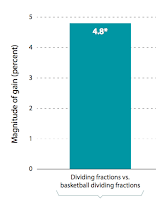Mary Meeker’s slide deck has a reputation of being the Delphic Oracle of tech. But, at 294 slides it’s a lot to take in. Don’t worry, I’ve been through them all. It has tons on economic stuff that is of marginal interest to education and training but there's plenty to to get our teeth into. We're not immune to tech trends, indeed we tend to follow in lock-step, just a bit later than everyone else. Among the data are lots of fascinating insights that point the way forward in terms of what we're likely to be doing over the next decade.
So here’s a really quick, top-end summary for folk in the learning game.
So here’s a really quick, top-end summary for folk in the learning game.
1. AI is getting bigger
Large tech companies see AI as their core strategy and enterprise spend on AI will increase. Google’s machine learning word recognition has just equalled human levels of accuracy. We can expect this to happen in the learning world with AI tools and services being used across the learning journey from engagement, support, chatbots, content creation, content curation, consolidation, assessment and wellbeing. For more detail see these AI in learning articles.
2. Employment flux
Technology is causing employment to change. Job roles are changing with more tech jobs but it looks as though unemployment is falling and that massive unemployment through tech is not happening, at least in the US. No need to panic – yet and be careful of hyperbole in this area.
3. Personalisation
This is getting ubiquitous online with Google, newfeeds, social media, music, movies, advertising, navigation, transport and buying online. It will happen in learning with everyone getting a unique learning experience that suits their needs and progress. Adaptive learning, based on individual and aggregated data, really does matter. There's lots of opportunities for personalised learning.
4. Data matters
Data matters but big data really matters. The problem in the learning world is that we have relatively small amounts of data at the user, course and institutional level. Expect data advantages to be leveraged elsewhere in online learning, on a greater scale.
5. Lifelong learning
Unusually there are five slides (232-236) devoted to Lifelong Learni
7. Workplace learning and re-skilling getting big
Workforce online learning is getting big with increases in skills training and re-skilling. The need for skills training is rising along with employment needs, so workplace learning and re-skilling is increasing.
8. Voice the new UI
Voice is the new UI – Alexa led the way, so expect voice to become a way of interacting with learning materials. We’ve just completed a 100% voice led implementation of WildFire. The entire experience, navigation and voice interactions, means there’s no typing at all and there's lots of ways voice will change learning.
9. Messaging expanding
Messaging is going through the roof, so expect this to enter the learning game through more dialogue-like services. As learners use messaging as their primary way of communicating online, so this will be expected in online learning – hence the rise of the learning chatbot.
10. Chatbots
These are getting big. Increasing use in customer service is leading to their use elsewhere. There are many reasons to suppose that chatbots will be big in learning and lots of possible applications. They are already in the learning world, through Otto (Learning Pool), WildFire, Filter and others.
11. Video expanding
Use of video is increasing, as it will in learning. We can expect more adjunct products in learning around video, for example AI-created content produced automatically from video. We’ve been doing this with WildFire, where we use the automatically grabbed transcript and AI to create online learning, in minutes not months.
12. Workflow changing
Slack, Zoom and other tools transforming workflow and that is where learning and performance support has to be positioned, in those tools to catch people in the process of working, where they need help and support. Otto is a workflow chatbot that is integrated into many of these social platforms, accessible and on hand for performance support.
13. New content types emerging
Huge use of Twitch for watching games, signals new media types and genres. These could be used in learning. We will increasingly see messaging, chat, voice and other forms of UI enter the learning world.
14. Subscription service growth
People happy to pay subscriptions for services, as long as pricing is right. I can see this expanding in learning, especially on the use of smart, AI-like services, such as chatbots.
15. Big tech
Big Tech companies moving into new sectors – Google into retail, Amazon into advertising – will continue and we can expect to see one of them move into the learning space some time soon. USA and China now the leading players. Europe’s role diminishing. My guess is that this will be on the back of the great strides they’re making on their core technical strategy - AI.
16. Tech saturation
As the world becomes saturated with mobile phones and other devices, sales growth is falling. They’re getting better, faster, smaller and cheaper. We can now get out of the ‘device-fetish’ era in learning and stop spending on devices to focus on services.
17. More online
People are spending more time online, up to 5.9 hours per day from 5.6 hours. If you want to get to learners you’ll increasingly find them online. This is borne out by the annual growth figures in online learning.
18. Physical retail sales declining
Physical retail sales de-accelerating as will physical delivery in classrooms, lecture theatres and training rooms. The pendulum swing to online will continue in retail and learning.
19. Privacy Paradox
As data becomes the new oil, oil leaks and spills also become a problem, so using data becomes more of a problem within the learning game. A curious but very real paradox.
20. Warning for Europe
There’s an interesting little warning for Europe on slide 35, saying there’s a danger of unexpected consequences on too strict data regulation that restricts innovation and progress in Europe in particular. Interesting and, as you can see here, I agree.


















